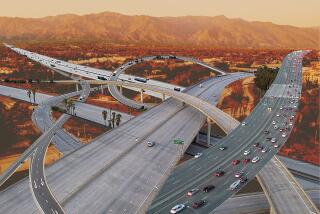Have Motorcycle, Will Fax
- Share via
Brian Alexander’s idea of a high-tech office is a Yamaha Royal Star motorcycle.
The Olympia, Wash.-based writer spent six weeks on the road with a portable notebook computer, a digital camera and a cellular phone tucked in the bike’s rear hatch as part of a corporate publicity stunt to demonstrate that technology makes it possible to work from just about anywhere.
Despite traveling 5,620 miles with some of the latest in high-tech equipment, Alexander insists he is no techie. He has owned a Pentium-equipped personal computer for only a year and, until this trip required it, he says, never sent an e-mail message.
“I don’t know anything about computers,” said Alexander, a freelance writer who was invited to take the trip by a public relations firm to show off some of the latest equipment from Canon Computer Systems.
While on the road, Alexander conducted interviews via cellular phone and typed notes on the laptop, which has a built-in color printer and scanner. His traveling companion, Shelley Metcalf, used a digital camera to take pictures, which were scanned into the computer and transmitted digitally with Alexander’s stories using a PCMCIA card that served as a wireless fax modem.
For the trip, Alexander lined up a series of assignments, including a story for Glamour magazine that required him to interview men around the country and a travel story about San Diego for Diversion, a travel and leisure magazine for physicians.
“If I hadn’t known that he was mobile and crossing the country on a motorcycle, I’d have absolutely no reason to suspect as much,” said Pamela Weiers, a contributing editor at Diversion in New York. “He filed his stories over e-mail and when I had a couple of questions, he checked in with me by cell phone.”
Alexander also wrote and filed a book review for the San Diego Union-Tribune.
“We did have a glitch, but to be honest I can’t remember whether it was our fax machine or whether it was his equipment,” said Arthur Salm, the Union-Tribune’s book editor. “It was no trouble.”
Alexander plotted his course mainly on older state highways and county roads rather than well-traveled interstates. His decision to spend time in smaller, rural towns contributed to his one recurring technical problem: lapses in cellular phone coverage. (He also went without coverage in some major cities because his cellular service provider did not have roaming agreements for some parts of the country.) In such cases, he would use a pay phone to speak with editors, then print out his stories and file them using a hotel’s fax machine.
Writers aren’t the only ones who can benefit from mobile technology. Alexander said the equipment he used would also be handy for traveling salespeople, real estate agents and insurance adjusters, among others.
Now Alexander is working on a piece for Diversion about the psychology of using technology on the road and what it’s like to combine business and pleasure.
“There’s an ever-present tension between ‘I should be having fun’ and ‘I have work to do,’ ” he said. “This trip proved to me that it can be done, but I don’t think I’d do it again.”
Times correspondent Karen Kaplan covers technology and careers. She can be reached via e-mail at karen.kaplan@latimes.com
More to Read
Inside the business of entertainment
The Wide Shot brings you news, analysis and insights on everything from streaming wars to production — and what it all means for the future.
You may occasionally receive promotional content from the Los Angeles Times.











